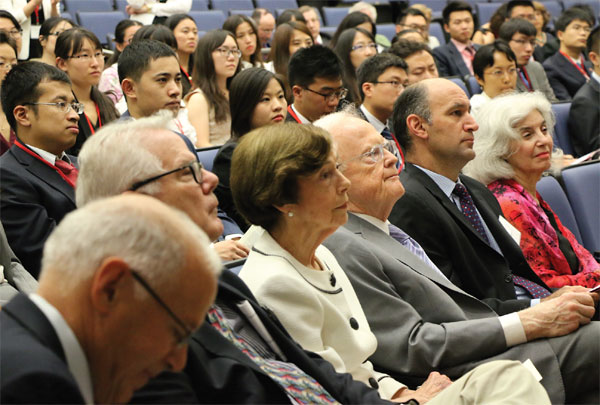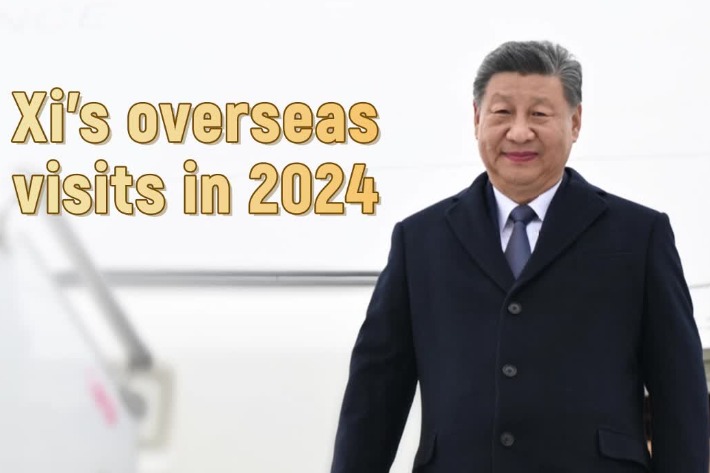Chinese students learn about US foreign policy from pros in DC

| From left: Stephen Orlins, president of the National Committee on US-China Relations (NCUSCR); David Lampton, former NCUSCR president and now a professor at Johns Hopkins University School of Advanced International Studies; Carla Hills, chair of NCUSCR and former US Trade Representative; Roderick Hills, former chairman of the US Securities and Exchange Commission and Carla Hills' husband; Yancy Molnar, vice-president of international government affairs of ACE Group, and Jan Berris, vice-president of NCUSCR, attend the opening ceremony on Wednesday evening for the United States Foreign Policy Colloquium for Chinese students held at the George Washington University. Chen Weihua / China Daily |
It's something many experts often find hard to figure out. But some 130 Chinese students are spending three days in Washington this week trying to understand how US foreign policy is shaped, especially when it comes to China.
Zhang Yating, a graduate student of law at Washington University in St Louis, said she immediately applied after learning on Sina weibo about the three-day United States Foreign Policy Colloquium run by the National Committee on US-China Relations.
"As a law student, I am interested in learning how US policy is made, particularly regarding trade and economics," she said.
"Coming to the US capital is also an eye-opener for someone from the middle part of the US," said Zhang, who is on her first trip to Washington.
Now in its 11th year, the program brings about 150 to 200 graduate students each year from universities across the US to Washington, interacting with current and former administration officials, members of Congress, as well as representatives from academia, the military, think tanks, businesses, lobbying firms and the media.
"We believe that this is a wonderful investment to build better understanding, which is absolutely critical to a strong bilateral relationship," NCUSCR Chair Carla Hills, a former US Trade Representative, told the students at the opening ceremony on Wednesday held at the George Washington University.
The some 130 students attending this year's program from May 28-30 come from 25 different Chinese provinces and are enrolled in more than 60 universities across the US.
There were 230,000 Chinese studying in universities across the US, accounting for 28 percent of all international students in the US, according to statistics from the Institute of International Education, a nonprofit organization in the US.
On Thursday, the students will have a day of lectures, including two on US foreign policy. The students will also attend panel discussions on business, NGOs and think tanks. They will listen to a history of the NCUSCR told by Jan Berris, who has worked there since the early 1970s, including dealing with the ping-pong diplomacy.
Since Stephen Sestanovich, the former US ambassador-at-large for the former Soviet Union, could not make it to the opening ceremony to deliver his keynote speech due to a cancelled flight, Stephen Orlins, president of NCUSCR, spoke about his passion in politics while as a young man and his vision for the future of China-US relations, a talk that was originally scheduled for Thursday.
He praised the founders of the NCUSCR for their vision in setting up the organization as early as 1966 when China was in the beginning of the "Culture Revolution" (1966-1976) and the US was involved in the Vietnam War, and the vision of Chinese leaders such as President Jiang Zemin and Premier Zhu Rongji for taking the opportunity of China's accession to the World Trade Organization to carry out economic reforms.
"You can do things if you have the vision," Orlins said.
After Orlins' talk, students bombarded him with a wide range of questions from cyber security, American's vision of the bilateral relationship to how the US can strike a balance between reassuring its treaty allies while maintaining good relations with China.
Orlins answered the questions but he also suggested the students direct the question about US rebalance to Kin Moy, the deputy assistant secretary of state for East Asian and Pacific Affairs, who will sit for an interview with the students on Friday. Moy just came back from Beijing in consultation with the Chinese for the upcoming 6th China-US Strategic and Economic Dialogue to be held in Beijing in July.
Besides talks, the students will also have the opportunity to visit the State Department, Commerce Department, the National Security Council and Congress.
Orlins said the program was created in the belief that these students are going to play a role.
"If they stay in America, they are going to play a role in educating Americans about China. And if they are going back to China, they are going to play an important role in educating Chinese about America," he said.
(China Daily USA 05/29/2014 page1)
Today's Top News
- Concern over EU breaching own data rules
- Guideline aims at improving elderly services
- Respiratory infections trend within expected range
- Human trafficking case prompting Thailand to reassure potential tourists
- Quake-hit Dingri county residents provided with hot meals, clothing and shelter
- Manila likely to be hung out to dry unless it provides Washington with pound of flesh































